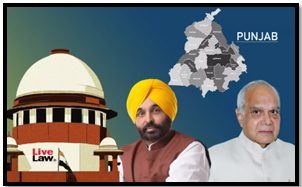LIMITING GOVERNOR’S POWER TO REFER BILLS TO PRESIDENT
Why in the news?
Governors of some Indian states are misusing their power by referring state legislation to the President without valid reasons. This practice raises questions about constitutional propriety and federalism.
source-TH
About the News:
- Recent Supreme Court Interventions: The Supreme Court intervened in cases involving Punjab, Tamil Nadu, and Telangana, criticizing Governors’ actions or inaction.
- Governors are found to be using the strategy of referring disliked Bills to the President instead of exercising their power to withhold assent or return the Bills.
- Implications of Presidential Assent:When the President, based on Union government advice, refuses assent, state legislatures have no recourse.
- This practice is seen as a way to give the Centre an indirect veto over state laws, subverting the federal structure envisioned in the Constitution.
- Kerala’s Legal Challenge:Kerala has filed a writ petition challenging the Governor’s action of referring Bills to the President and the subsequent refusal of assent.
- The petition argues that this misuse of the provision undermines state autonomy.
- Past Supreme Court Rulings:In Punjab, the Court ruled Governors must return Bills to the Assembly if they withhold assent and must grant assent if the Assembly readopts the Bills.
- In Telangana, the Court emphasized that Governors should act on Bills “as soon as possible,” implying timely action is a constitutional duty.
- Current Concerns:Despite the Supreme Court’s guidance, Governors in West Bengal and Kerala continue to refer Bills to the President without valid reasons.
- Several Bills from Kerala, not typically requiring Presidential assent, were referred to and rejected by the President.
- Broader Constitutional Question: The practice transcends political motivations, raising a fundamental question about indirect central intervention in state legislative matters.






